Convert Your Internship Into a Full-Time Offer

It’s a Conversation With Your Boss
In an internship and then looking to convert that into a full time opportunity? A good place to start would be to have a conversation with your manager, with your direct boss.
She may not be the one who makes the decision - but it’s where to start
Now your direct boss may not be the one that ultimately makes that decision, but that's where we start to “raise the flag up the flag pole” in case that question needs to be addressed by another person who oversees the budget for new hires, to see if there's a headcount. Your boss may or may not have the headcount information or the authority - it can depend - and that's the place to start.
Have the conversation, no matter what.
Whether or not there is an opportunity for full time employment, it's good to express your interest in and intention to have a return offer. Absent having an extremely bad experience, this can be a smart move for you. The offer may only come if you ask for it, or show an inten...
Networking: Why Would Anyone Want To Talk To Me?
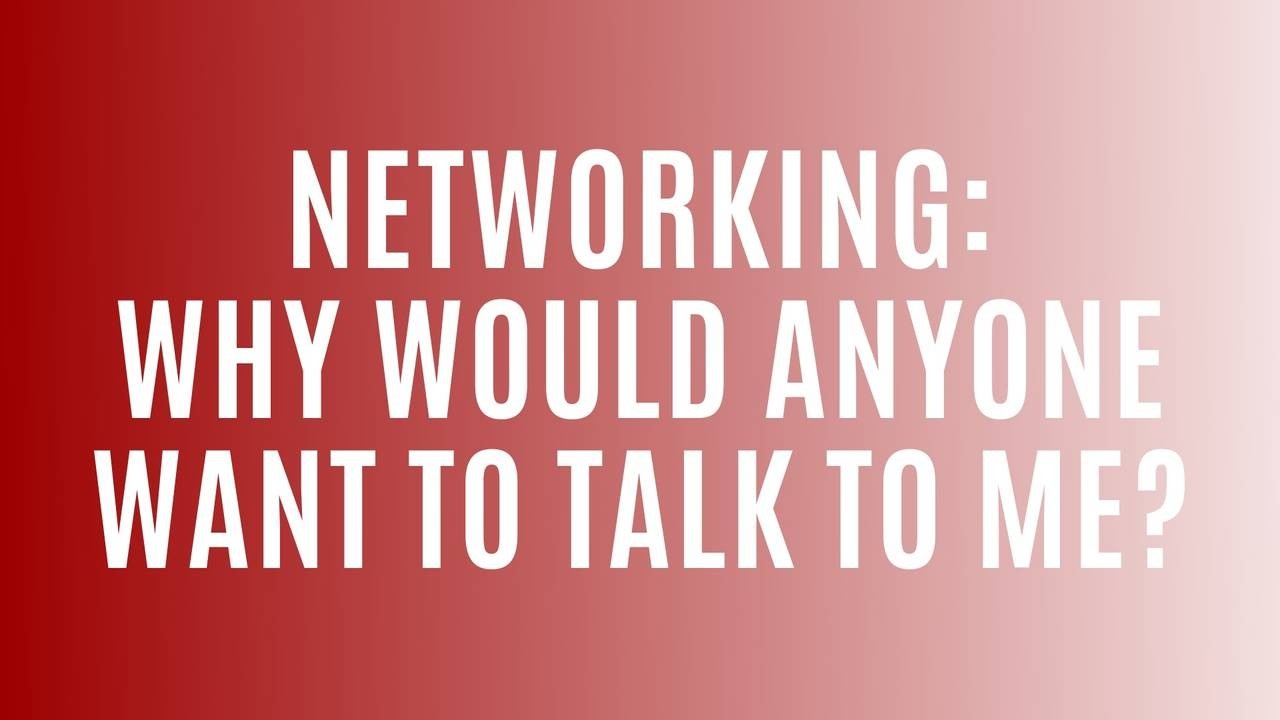
If you let it, it will change everything for you.
“Stuart, The main thing I can't figure out about networking is why anyone would want to talk to me.”
Let's talk about why and if anyone would be willing to talk to you,
This is the time of graduation. The time of vacation and if your job hunt and everything is figured out, or you're going to grad school or whatever the reason is - you feel like you have time to take a vacation.
And it's also a time to double down on the job hunt for those looking for internships still, or for full-time roles.
Now, one of the things that you may have discovered is that some people seem to succeed very seemingly easily in the job hunt. And there's a vast majority of us that continue to struggle with this, like I did.
What I've seen is that online applications are really not where it's at anymore.
The technology has been, um, sad. The tech technology has made it, uh, it's really seduced us and caused us to fall asleep and lose track ...
The Math of the Job Hunt
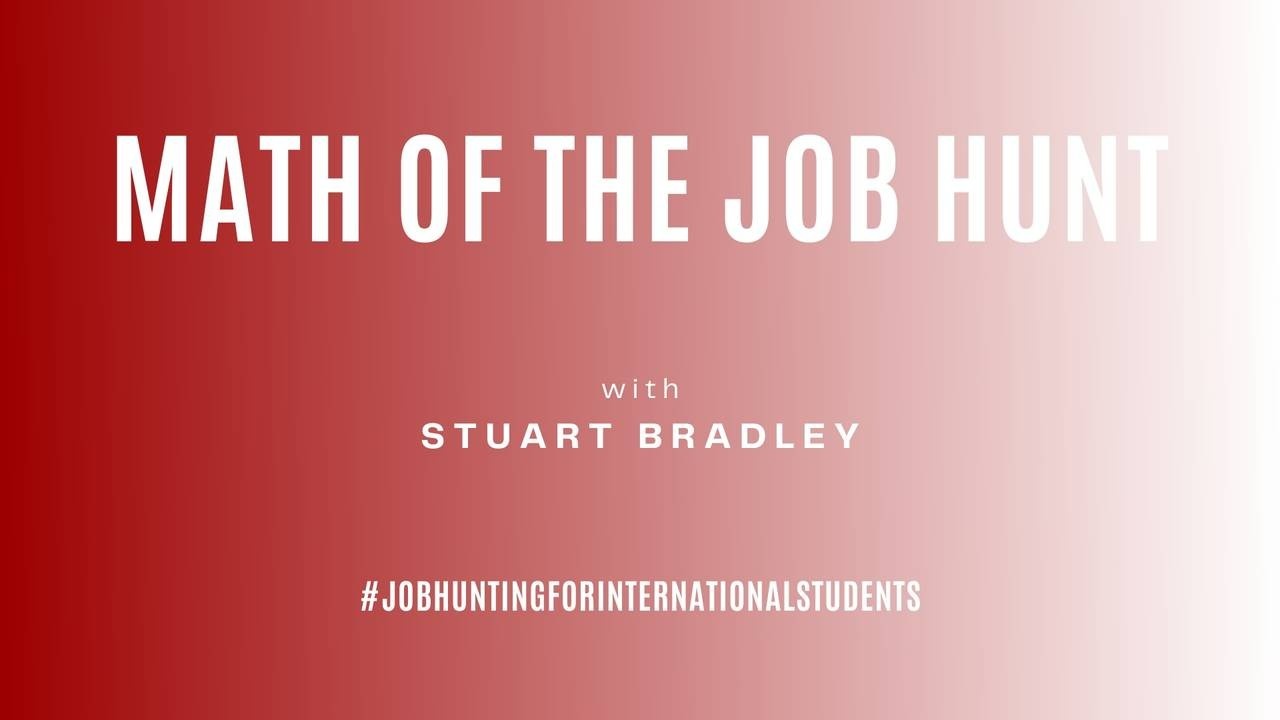
The Magic (and Math) of Getting a Job
Optical Illusions in the job hunt
We’ve all seen optical illusions before - and they exist in the job hunt, too. Try this one: “summer has started”. For those still job hunting, the illusion is that there’s no more time left to get an internship or job. Then decisions are made not to try, or to double down on summer academics. Meanwhile, the start of summer was just a bit optical illusion.
This summer, I say let the illusion work in your favor. And if you’re a fan of magic, let the magic work in your favor, too. With so many companies out there, all needing to solve problems, the opportunities to get hired are endless. When action is taken by you, the job hunter, things happen unexpectedly all the time in the job hunt which simple math does not explain.
Try this one: messaging someone with a nice script result in suddenly getting invited to an interview. All you did was send a quality templated message and an invite to interview was extended ...
How to suck less in the job hunt
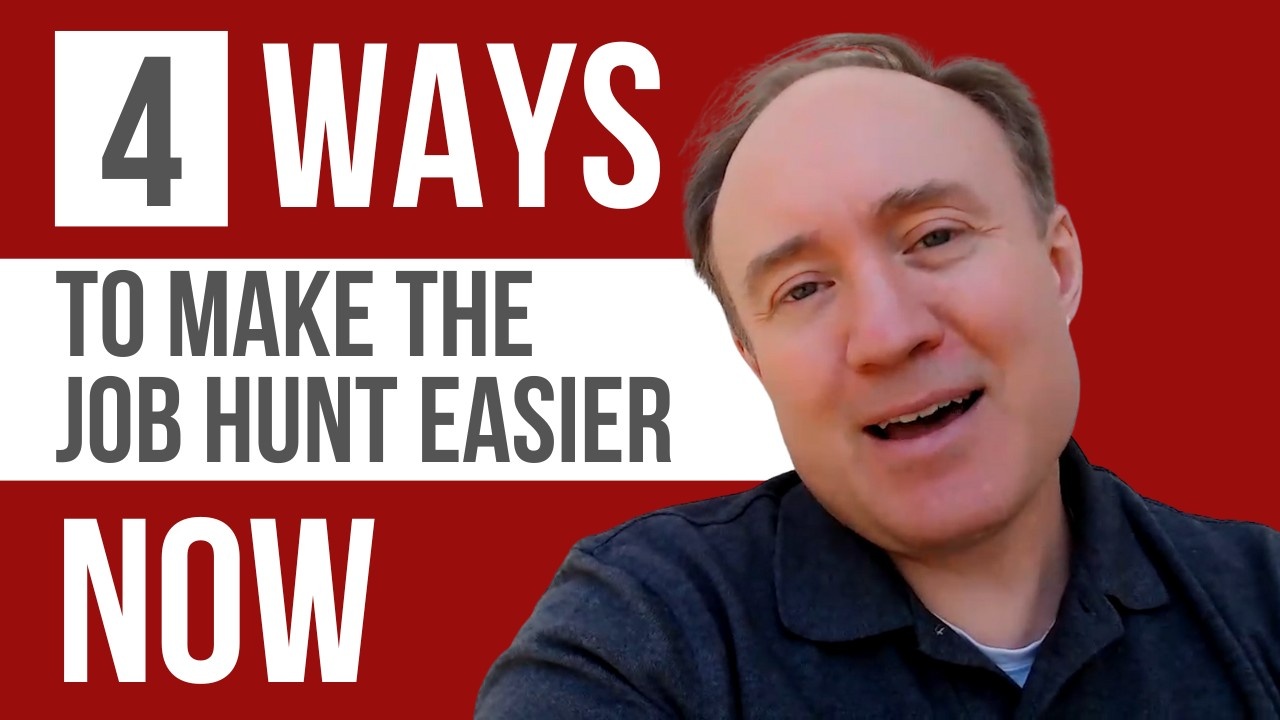
Making it harder to get rejected as an international student
Hey everyone, Stuart here! Are you finding it hard to get a job here in the US, such as an internship using CPT or a full-time offer using OPT? Here are a few tips that are going to make this easier for you - making it harder for you to get rejected!
- Ariel used this information to gain an $8,000 monthly internship at a Fortune 100 firm just as summer was starting (her story on Youtube).
- Alvin used what I'm going to be teaching here to get his full-time offer at JP Morgan in New York City, living, living the dream life as it was for him (his story on Youtube)
Tip #1: Stop drawing the wrong conclusion
Concluding that it's too hard to find a job takes you out of the game. Maybe you expected a hard thing to be easy, so you stopped. Let’s say you’ve stopped trying to job hunt at all. Sometimes stopping to do certain things IS the right move. For example, applying online and hoping to hear back just doesn't work. If you...
3 BEST Expected Salary Responses
Your Salary: “What’s your expectation?” Answered Here
The problem:
What is your expected salary? Coming into my master’s program from a startup, I didn’t have one, but if I did, I can guarantee you it wasn’t very high.
So how to handle this question when it comes up? The short answer is this: expect at least the “market rate”.
Mrs. Market (the job market) is not kind to people who feel like asking for less than they are worth.
The job market rewards winners.
When does this question come up?
It might occur right there on your application. It could come in an interview.
How to respond to this question?
This is a very clever question posed as a test of your “street smarts”, a test of your maturity in negotiating professional or business topics.
In traditional negotiation strategy, there is a saying: “the first person who says a number loses”.
Here’s how to apply that: answer this question in a way so that you don't give them a number right away. Instead, give them a rang...
Overcoming A Lack of Experience
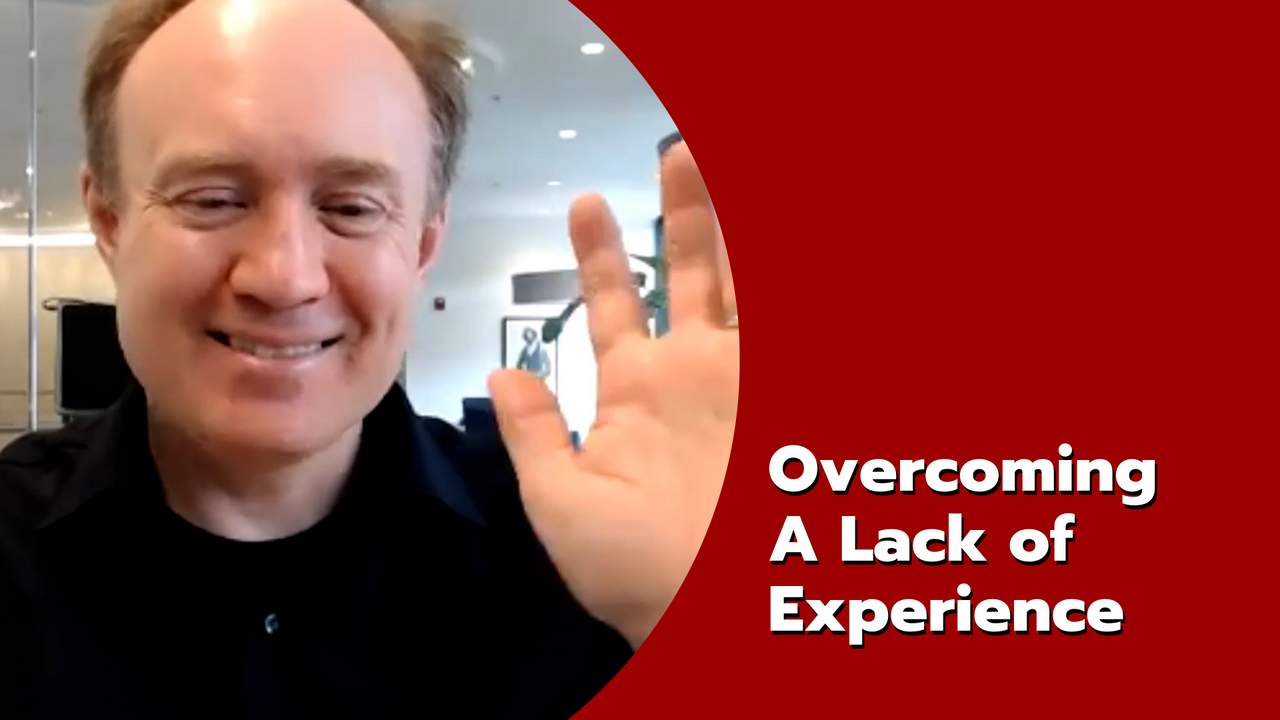
No experience? Are you screwed?
Let's cover that in this video today. So I had one of my VIP students write in and ask as follows:
“Hey, Stuart I have an interview coming up with the CFO of the company. And they're asking me for 2-4 years of experience in the job description. What should I do? Because I don't have full-time experience.”
This is that classic “how do I get experience if I don’t have it” situation. And in this video, I am going to solve that for you.
Invited to interview - and feeling you lack experience
So this individual in our program got invited to interview. First of all, what does that mean? It means this:
“If granted a chance to interview, you already have what it takes to get the job.”
You already have what it takes. So if you're sitting there with that interview coming up and you're concerned about your experience, recognize that that is not a factor here. They already granted you an interview - They already think you can do the job but they need to c...
Post-interview Etiquette: The Hand-written Thank You Letter
Should I Tell Them I Sent A Thank You Letter or Not?
This is an interesting question about etiquette I just got from a student in my 12-week job offer intensive and thought to share it as well as my response. As you take this in, you can also assess what feels right for you. If you like this approach, I welcome you to use this.
The question is, “do I need to tell the interviewer that I'm sending them a thank you letter?” Do you need to “tell” the interviewer you’ll send such a note?
First, you have step one: you have the interview. Step two is to thank the interviewer. So, how do you want to thank them? Send the thank you letter, right? Or some sort of thank you. So the question is, “how should I execute my thank you? And do I need to tell them to expect the thank you?”
Let's just talk about “thank yous” for a minute, and then I'll answer the specific question.
When you leave the interview room, the interview is not yet over.
I’ve sat in a lot of rooms both as interviewer a...
“Do You Need Sponsorship?” This Answer May Work Best
“Stuart, When an interviewer asks me, Do I need sponsorship? How should I respond?
Great question!
How You Answer vs Who Is Asking The Question
How many times are you gonna get that question?
With one group: always. With a second group, rarely.
Never: With executives looking to solve a problem, they care if you can help solve a problem. HR policy changes if they need you.
Always: With HR and recruiters. They get paid to enforce HR policy.
Knowing how most job hunters hunt, you get asked this probably every single time you speak to somebody about your job hunt.
I was an international student working on work visas for almost 10 years of my life. So I know a little bit about how we can handle this in addition to helping so many others achieve their dream jobs.
How To Answer This Question
So how should you answer? Well, first of all, recognize this one thing: It depends on who is asking the question.
There are two kinds of people in your job hunt that you will count as...
2 Simple Steps I Teach to Never Miss Interview Opportunities Again
Every Conversation Is An Interview
Welcome to 2022!
We're going to open up the blog in 2022 by teaching how never to miss an opportunity again. There are two things you need to absorb here and it's going to be short and sweet and when you adopt these two concepts, you are never going to miss an interview again.
The two things that you need to know/do in order to get those interviews are:
1) Make interviewing your priority in 2022
2) Realize that every conversation is an interview
Make Interviews Your Priority
If trying to get a job, it's most likely the case that you are trying to send applications out and you are hoping that some sort of conversation ensues.
In 2022, instead, look beyond the application step and get into conversation and develop relationships with the people to whom you are sending the applications.
There are ways to do that and that's the details and implementation is going to be beyond the scope of this short post.
So, change your mind about what you’r...
Can I Job Hunt Over Christmas?
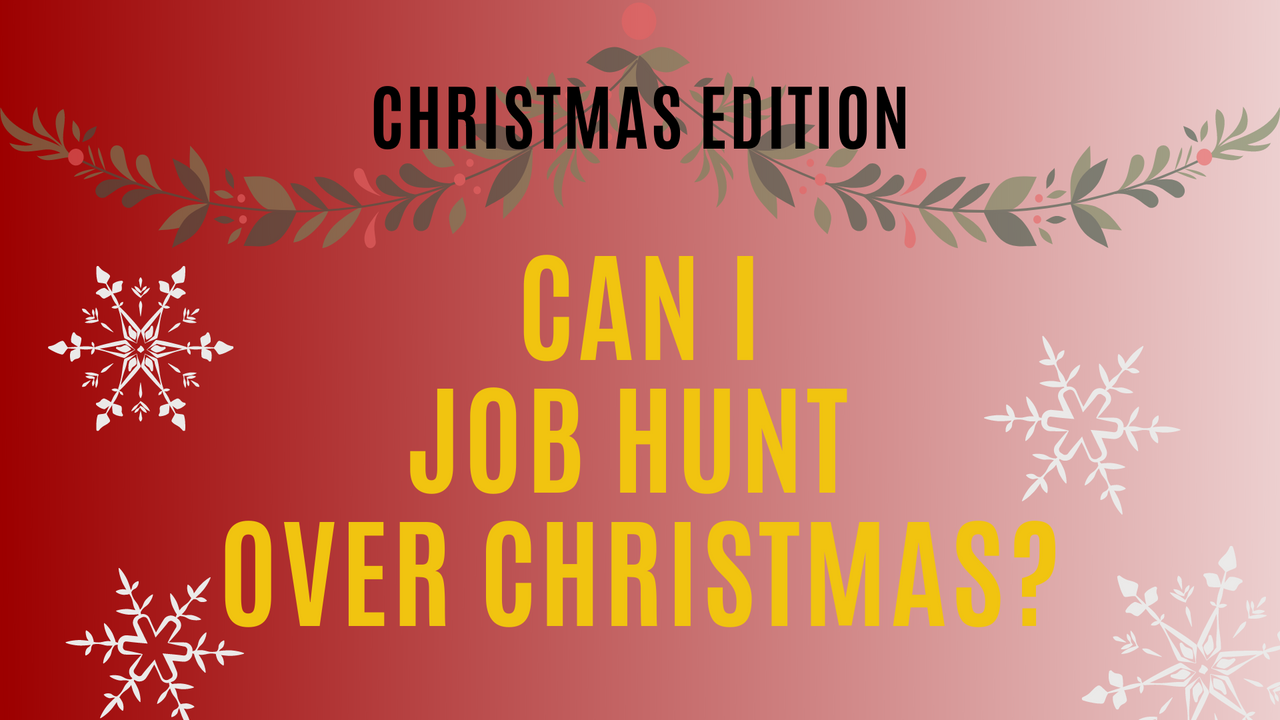
How To Job Hunt During Christmas Like A Pro
There can be a lot of confusion about how to job hunt over the holidays so I'm going to clarify that for you here and thereafter, let you not be confused about what you can and can't do when you should and should not message people over the December holidays into January.
Today, we're gonna talk about holiday do's and don'ts, and this is going to be a super good level setting exercise for you so that you can step away from a lot of the assumptions and the thoughts that are kind of spinning in your head.
I know that I can get into these little, um, thought, uh, bubbles at times and get separated from what is the situation that I'm dealing with. And for so many of us job hunting around the holidays, we have all these thoughts and ideas about how it's probably not convenient for example, to do this or that, or maybe I shouldn't do this or that and it's all generally incorrect being in business for decades.
The business world has its rhythm...


